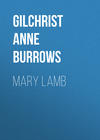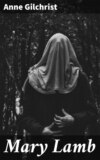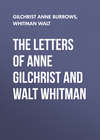Kitabı oku: «Mary Lamb», sayfa 15
A month after this was written Charles Lamb followed his friend. A seemingly slight accident, a fall which wounded his face, brought on erysipelas, and he sank rapidly, dying the 27th December 1834. For once, Mary's affliction befriended her. Though her mind was not wholly obscured at the time, for she was able to show the spot in Edmonton churchyard where her brother had wished to be buried, yet it was so far deadened that she was unable to comprehend what had befallen her; and thus she remained for nearly a year.
None thought of Mary with tenderer sympathy than Landor, or strove with more sincerity to offer "consolation to the finest genius that ever descended on the heart of woman," as he fervently described her. "When I first heard of the loss that all his friends, and many that never were his friends, sustained in him," he wrote to Crabb Robinson, "no thought took possession of my mind except the anguish of his sister. That very night, before I closed my eyes, I composed this: —
TO THE SISTER OF CHARLES LAMB
Comfort thee, O thou mourner! yet awhile
Again shall Elia's smile
Refresh thy heart, whose heart can ache no more.
What is it we deplore?
He leaves behind him, freed from grief and years,
Far worthier things than tears,
The love of friends without a single foe;
Unequalled lot below!
His gentle soul, his genius, these are thine;
Shalt thou for these repine?
He may have left the lowly walks of men;
Left them he has: what then?
Are not his footsteps followed by the eyes
Of all the good and wise?
Though the warm day is over, yet they seek
Upon the lofty peak
Of his pure mind, the roseate light that glows
O'er death's perennial snows.
Behold him! From the spirits of the blest
He speaks: he bids thee rest.
About a month after her brother's death, their faithful old friend, Crabb Robinson, went to see Mary. "She was neither violent nor unhappy," he wrote in his diary, "nor was she entirely without sense. She was, however, out of her mind, as the expression is, but she could combine ideas, though imperfectly. On my going into the room where she was sitting with Mr. Walden, she exclaimed, with great vivacity, 'Oh! here's Crabby.' She gave me her hand with great cordiality, and said, 'Now this is very kind – not merely good-natured, but very, very kind to come and see me in my affliction.' And then she ran on about the unhappy, insane family of my old friend – . Her mind seemed to turn to subjects connected with insanity as well as to her brother's death. She spoke of Charles, of his birth, and said that he was a weakly but very pretty child."
In a year's time she was herself once more; calm, even cheerful; able, now and then, to meet old friends at the Moxons'. She refused to leave Edmonton. "He was there asleep in the old churchyard, beneath the turf near which they had stood together, and had selected for a resting-place; to this spot she used, when well, to stroll out mournfully in the evening, and to this spot she would contrive to lead any friend who came in summer evenings to drink tea, and went out with her afterwards for a walk." Out of very love she was content to be the one left alone; and found a truth in Wordsworth's beautiful saying, that "a grave is a tranquillising object; resignation, in course of time, springs up from it as naturally as the wild flowers besprinkle the turf."
Lucid intervals continued, for a few years longer, to alternate with ever-lengthening periods of darkness. That mysterious brain was not even yet wholly wrecked by the eighty years of storms that had broken over it. Even when the mind seemed gone the heart kept some of its fine instincts. She learned to bear her solitude very patiently, and was gentle and kind always. Towards 1840 her friends persuaded her to remove to Alpha Road, St. John's Wood, that she might be nearer to them. Thirteen years she survived her brother, and then was laid in the same grave with him at Edmonton, May 28th, 1847; a scanty remnant of the old friends gathering round, – "Martin Burney refusing to be comforted."
Coleridge looked upon Lamb "as one hovering between heaven and earth, neither hoping much nor fearing anything." Or, as he himself once, with infinite sweetness, put it, "Poor Elia does not pretend to so very clear revelations of a future state of being. He stumbles about dark mountains at best; but he knows at least how to be thankful for this life, and is too thankful indeed for certain relationships lent him here, not to tremble for a possible resumption of the gift." Of Mary it may be said that she hoped all things and feared nothing, – wisest, noblest attitude of the human soul toward the Unknown.
LIST OF AUTHORITIES
Life, Letters, and Writings of Charles Lamb. Edited by Percy Fitzgerald, M.A., F.S.A. 1876.
The Works of Charles Lamb. Edited by Charles Kent [in which, for the first time, the dates and original mode of publication were affixed to the Essays, &c.]. 1878.
Poetry for Children, by Charles and Mary Lamb. Edited by Richard Herne Shepherd. 1878.
Mrs. Leicester's School, by Charles and Mary Lamb.
Tales from Shakespeare, by Charles and Mary Lamb. 1807.
Final Memorials of Charles Lamb, by Talfourd. 1848.
Charles Lamb: A Memoir, by Barry Cornwall. 1866.
Mary and Charles Lamb, by W. Carew Hazlitt. 1874.
My Friends and Acquaintance, by P. G. Patmore. 1854.
Letters, Conversations, and Recollections of Coleridge, by Thomas Allsop. Third edition. 1864.
Early Recollections of Coleridge, by J. Cottle. 1837.
Biographia Literaria, by Coleridge. Second edition. 1847.
Life of Coleridge, by Gillman. Vol. I. 1838.
Memoirs and Letters of Sara Coleridge. Edited by her Daughter. 1873.
Life of Wordsworth, by Rev. Dr. C. Wordsworth. 1851.
A Chronological List of the Writings of Hazlitt and Leigh Hunt, preceded by an Essay on Lamb, and List of his Works, by Alex. Ireland; printed for private circulation. (The copy used contains many MS. additions by the Author.) 1868.
Recollections of Writers, by Charles and Mary Cowden Clarke. 1878.
Six Life Studies of Famous Women, by M. Betham Edwards. 1880.
Diary, Reminiscences, and Correspondence of Henry Crabb-Robinson. Edited by Dr. Sadler. 1869.
Memoir of William Hazlitt, by W. Carew Hazlitt. 1867.
Spirit of the Age. & Table Talk, by Hazlitt. 1825, 1826.
Autobiographical Sketches. & Lakes and Lake Poets. by De Quincey. 1863.
William Godwin, his Friends and Contemporaries, by Kegan Paul. 1876.





